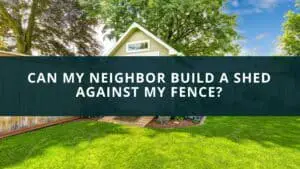Having a neighbor comes with perks, but it could also be a nuisance, especially if your neighbor is constantly invading your space. So, you might ask, can my neighbor enter my garden without permission?
No, your neighbor can’t enter your garden without your permission. This constitutes a trespass, and they’ll be liable. But they might have a reason to enter if they have to do preservation work on their property that requires them to enter your garden. Even then, it’s best to ask for permission.
However, if you have a neighbor entering your garden without permission and for no valid reason, there are ways to deal with them. Here, we discuss whether a neighbor can enter your garden without permission.
Quick navigation
Rule on Trespass
Trespass involves entering another person’s property unlawfully without their permission. This is what your neighbor would be liable for if they enter your garden without your permission. However, it’s legally permissible for your neighbor to gain access to your land without your permission if they do so because they need to fix a part of the property.
If they can’t fix that part of the property without gaining access to your garden, then it won’t be trespass if they enter your garden without permission solely to fix the problem.
But even this isn’t advisable. In order to maintain a good relationship with neighbors, it’s always better to ask for permission. This is best face-to-face, but it can also be through a letter. In that case, you should refuse your neighbor entry into your garden. If you do, the neighbor might be able to get a court order that compels you to grant such access. This will only strain the relations between you.
When Can Your Neighbor Enter Your Garden Without Permission
Neighbors may be able to enter your garden without getting your permission if they need to do preservation work on their property that’s only possible from your property. Preservation works that could warrant your neighbor’s entry into your garden include:
- Maintenance, renewal, or repair of the building
- Repair, replacement, or clearance of drainage, cable, pipe, or sewer
- Clearing or filling a ditch
- Removal or felling of a tree, shrub, or any other plant that’s likely dangerous due to being diseased, dead, or with insecure roots.
The neighbor will have to prove that gaining access to your garden is necessary for preserving their property and that the necessary work is impossible or difficult to carry out if they don’t gain entry into your land. Outside of these reasons, your neighbor should never come into your garden or any part of your property without your consent.
Suppose you’re the neighbor who wants to gain access to the garden beside your property, and the owner won’t grant access. You should consider getting a legal opinion before you decide on your next action.
How To Deal with Neighbors Entering Your Garden Without Consent
If your neighbors are entering your garden without your permission. There are several ways you can deal with it. That includes:
1. Approach Them and Talk About It
This should be the first step for you. No need to go gung-ho on your neighbor just because they access your garden without your permission. Talk to them and tell them to stop entering your property. Doing this physically is best. But if you don’t feel safe for a valid reason, you should try to write a letter to them. With letters, you should keep a copy of the correspondence, which makes it even better because you have some evidence for later.
2. Talk To the Landlord
If the neighbors are renting the property and won’t stop entering your garden without your permission, complain to the landlord. This will most likely stop the behavior if it persists. The landlord would most likely evict the neighbor. If the landlord doesn’t act, it gives you more ground for when you want to file a legal action. If you don’t know who the landlord is, you can check with the local council tax department.
3. Call The Police
This is the last resort option. If the neighbor commits or may likely commit a criminal offense on your property, such as assault or breach of peace, you can call the police. Calling the police might be what the neighbor needs to see they’re in the wrong. But it could also increase tensions. At least, it’ll stop them from entering your garden.
4. Sue For Trespass
If the neighbor refuses to heed your requests and warning, you might want to have to take legal action. This can be suing them for trespass, getting a restraining order, and getting damages. If you plan to take court action, you should ensure that you have records to back up your claim. This could include call logs to the police reporting the neighbor, video evidence, corroborations from family members and other neighbors, etc.
You don’t necessarily need to file an action. You might threaten it first and get a letter from a lawyer. This should stop the trespass. But if you still want to go further and file a civil suit, you should know that it will cost you money, especially if you’re not entitled to legal aid. If the neighbor caused some damage to your garden, this might not be a bad idea.
5. Fence Or Put Boundaries on Your Garden
Having boundaries around your garden makes it easier for you to ensure that no one gets in without permission. In addition, with clear boundaries, the neighbor will know when they’re trespassing on your property, and if they don’t stop, you can easily enforce your right against them.
Suppose your neighbor is trespassing in your garden. You need to first tell them to leave. If they refuse to, then you can take other actions. You can also put a sign there so they know there’s a boundary.
Looping
If your neighbor has overhanging branches entering your garden or any other part of your property, you have the right to trim the branches. But you’ll still have to get your neighbor’s permission on how to dispose of them. If your neighbor should have a fruit tree, and fruits from the tree should fall into your garden. It remains the property of the neighbor.
If you have a tree in your garden and a branch falls on the neighbor’s property, it’s still your duty to repair whatever damage it may cause to their property.
In Conclusion
Your neighbor entering your garden without permission amounts to trespass, and they may be liable. There are only a few instances where this may be permissible. Outside of those instances, you can take action to prevent them.



